Pride Month: How are LGBTQ+ fans groups helping to change football?

In the first feature article of his Pride Month series on football, Danyal Khan looks at how supporters groups for LGBTQ+ people and allies are contributing towards greater understanding around inclusion…
“Football is not meant for gay people.”
That’s the type of comment many LGBTQ+ people have received on social media before, and comments like this are the reason why many LGBTQ+ people feel that they can’t have an active involvement in the “beautiful game.”
- Pride Month: To what extent is football becoming more inclusive for the LGBTQ+ community?
- Pride Month: The rise of LGBTQ+-inclusive football clubs in the UK
- Pride Month: Why is women’s football so much more LGBTQ+ inclusive than the men’s game?
But these incidents don’t just happen on social media. A select few fans, who are now the minority, feel it’s fine to just throw derogatory terms left, right and centre at players without any consequences.
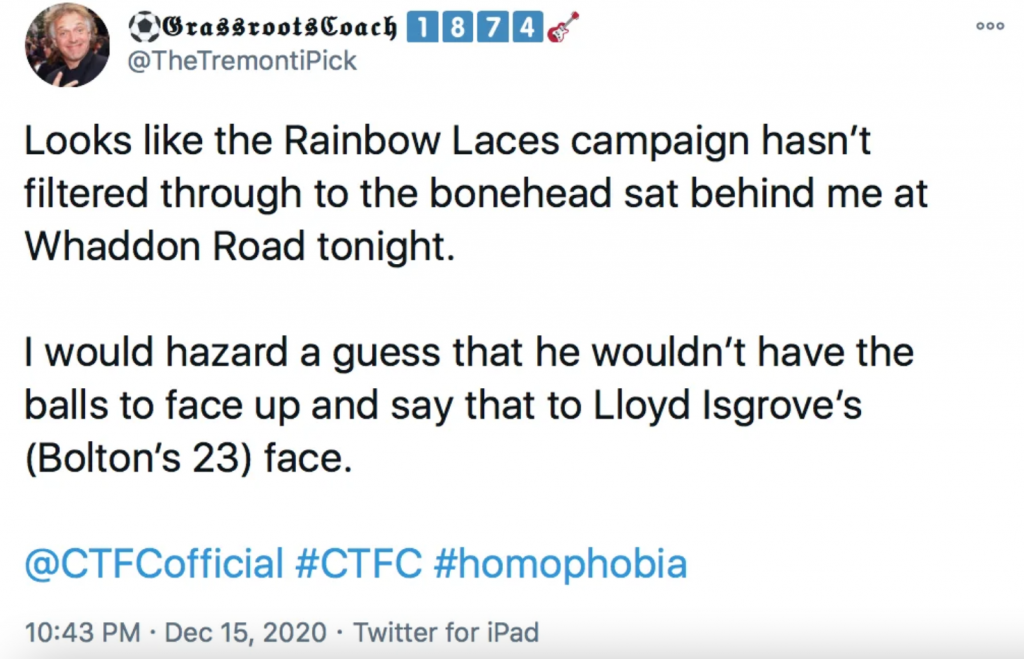
Thankfully in the battle against homophobia, biphobia and transphobia in football, certain individuals are starting to stand up to perpetrators in order to show them that derogatory comments are not acceptable in this current progressive footballing environment in the UK.
The likes of Kick It Out have made it easier now for fans to feel safe to report other fans via an app – meaning fans don’t have to directly confront a perpetrator.
Villa and Proud founder Samuel Timms is one of a minority of people who have directly stood up to homophobia on the terraces.
“I never had to report fans at Villa Park because of homophobic abuse being directed at a player. But I had to do it last season,” Timms reveals. “Someone used the word fa**** three times in front of me.”
“I actually decided to speak to this person at half-time. He had no idea I was gay, he couldn’t tell otherwise I don’t think we would have had the discussion in the calm manner that we did.
“But it’s clearly a generational problem. And I was worried when this guy was doing it with a little child sat next to him, who could have been related to him.
“It’s not good for him to hear the venomous abuse that was coming out from his mouth, so that’s why I stepped in.”
And this tale of witnessing homophobic abuse on the terraces or online is a common story amongst many LGBTQ+ football fans.
Click on the audio clips below to hear different LGBTQ+ football fans speak about their experiences of homophobia in football...
Whilst many factors point towards the negatives of football not being inclusive for the LGBTQ+ population, there is a lot of positive work being done by individuals and groups that goes unnoticed in the battle to make football a sport for everyone.
The likes of Stonewall, Football v Homophobia (FvH) and Sky Sports are just a few of the organisations who work hard trying to make football inclusive for LGBTQ+ people all around the world.
Whether that’s tackling deep-rooted issues within the game like Stonewall and FvH do, or even giving the exposure to the LGBTQ+ stories that don’t get covered by other outlets like Sky Sports do, all these organisations play a key part in making football as inclusive as it can be.
Sky Sports writer, editor, and the founder of Sports Media LGBT+ Jon Holmes joined me to discuss everything LGBT+ inclusivity in football…
How LGBTQ+ fan groups give lesbian, gay, bi and trans fans confidence to attend football matches
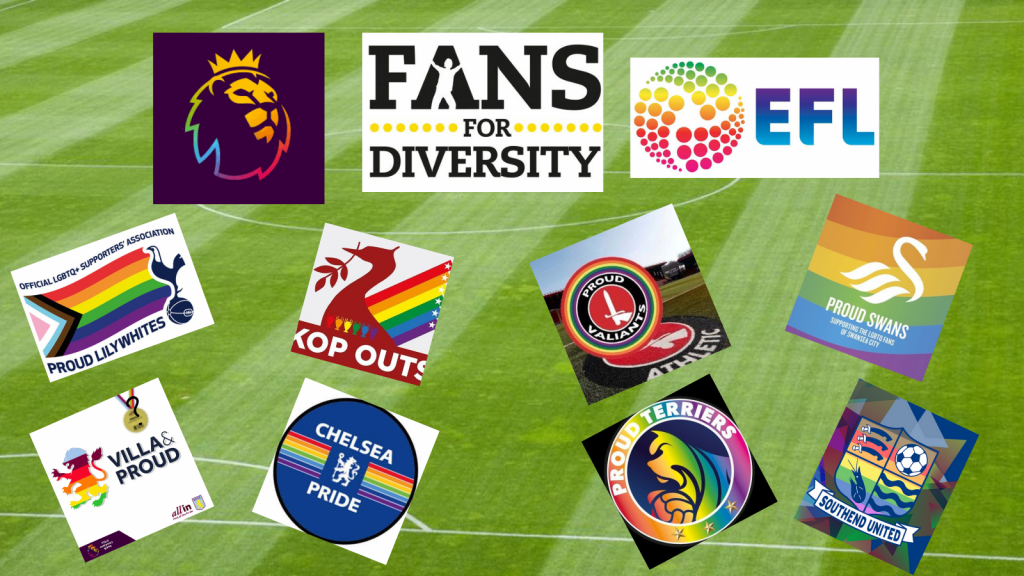
“What has your sexuality got to do with being a football supporter?”
This is one of the questions panel guests had to answer in December 2020 as part of the Football Supporters’ Association (FSA) panel on the importance of LGBTQ+ fan groups.
Misconceptions fly around about how much of a ‘nuisance’ these groups are to the typical heterosexual football fan who doesn’t see the need for these networks in the beautiful game.
Unfortunately, negative comments circulate around social media like “don’t bring politics into football.”
This is counteracted by the positive allies out there who do show their support to their respective LGBTQ+ community.
An example I have looked into in terms of responses to fan communities online is Liverpool FC’s group Kop Outs.
Two posts from Kop Outs themselves and the club demonstrate both sides when it comes to how fans perceive and react to LGBTQ+-based social media posts.
The first post is about the Kop Outs banner being introduced to the well-known Kop End at Anfield. This was how a few people reacted on social media…
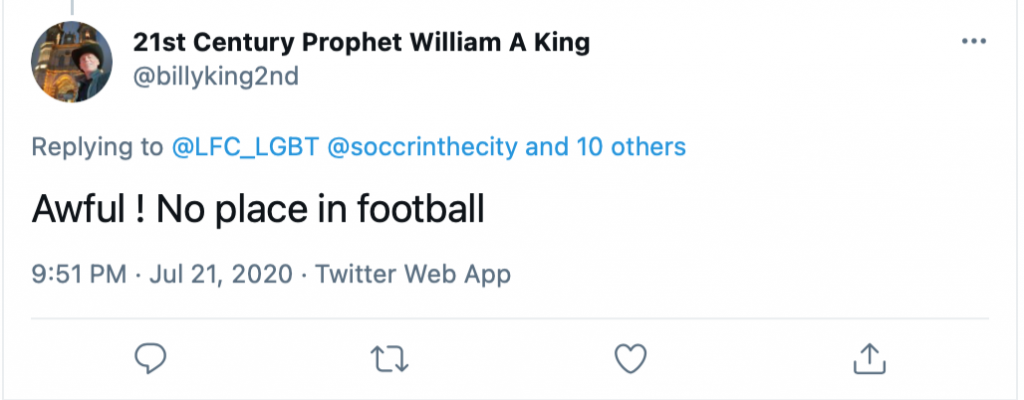
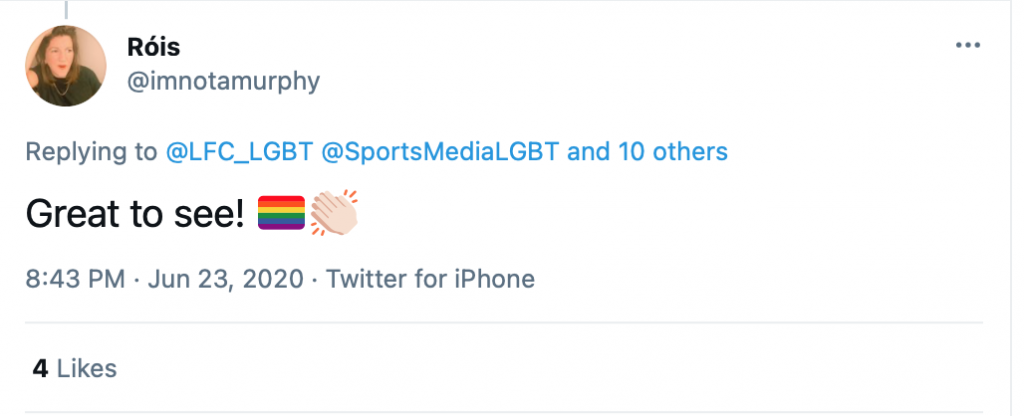
A mixed reaction – not a surprise to see. This ‘pic n mix’ type of reaction is also demonstrated in the next example, where Liverpool FC put out a post recently to celebrate #IDAHOBIT (International Day Against Homophobia, Biphobia, and Transphobia).
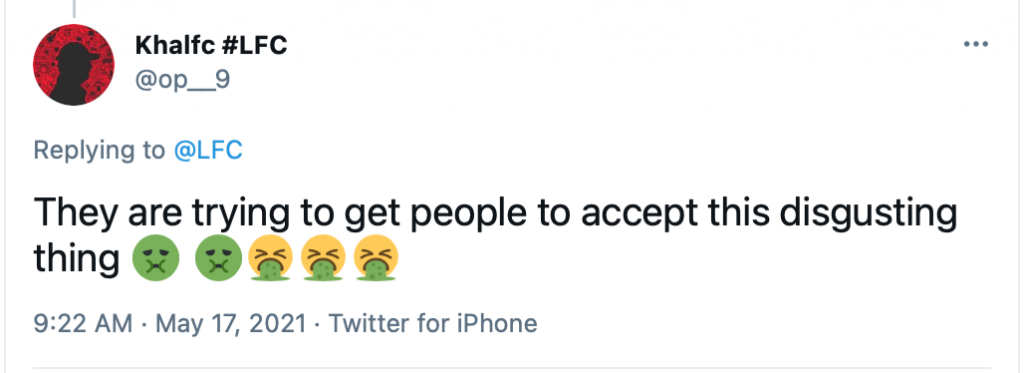
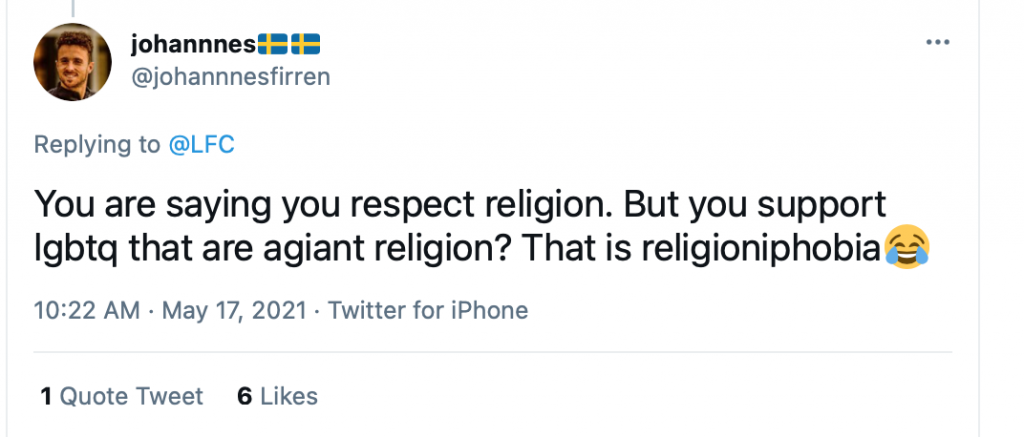
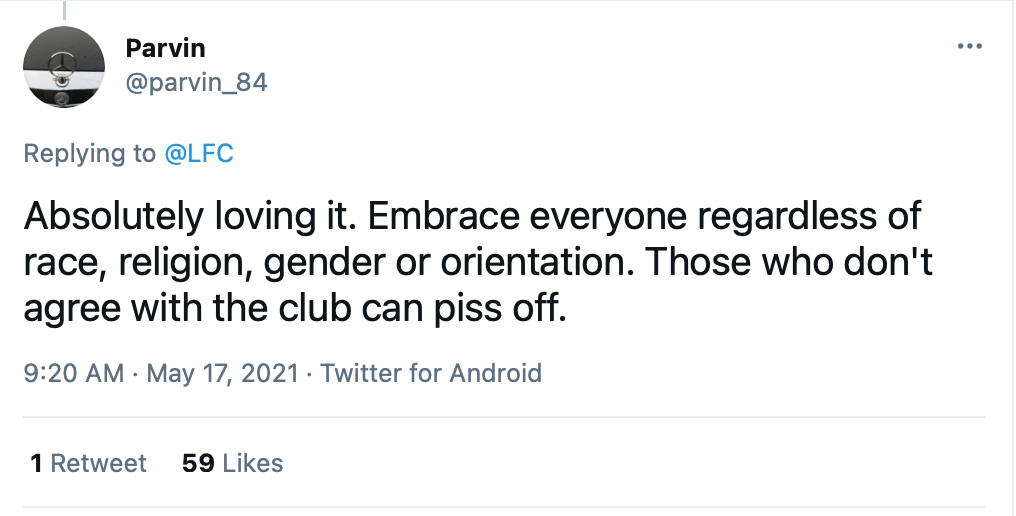
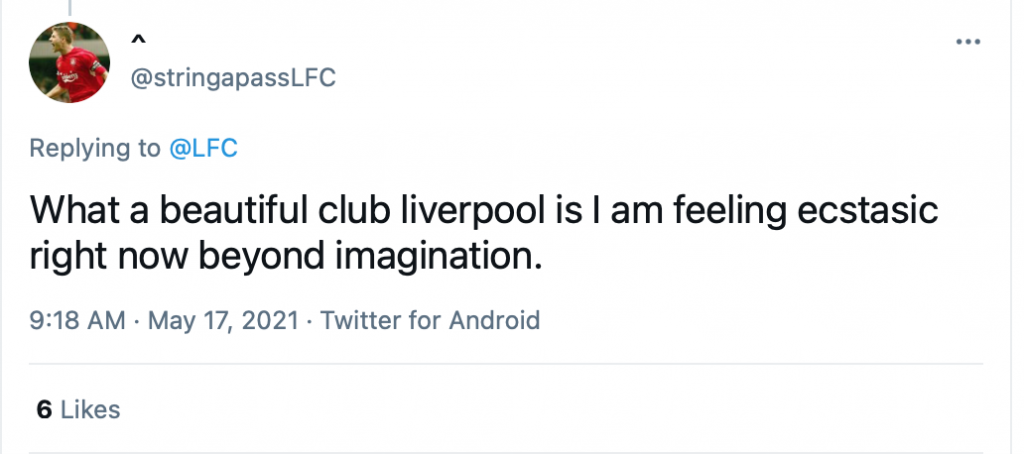
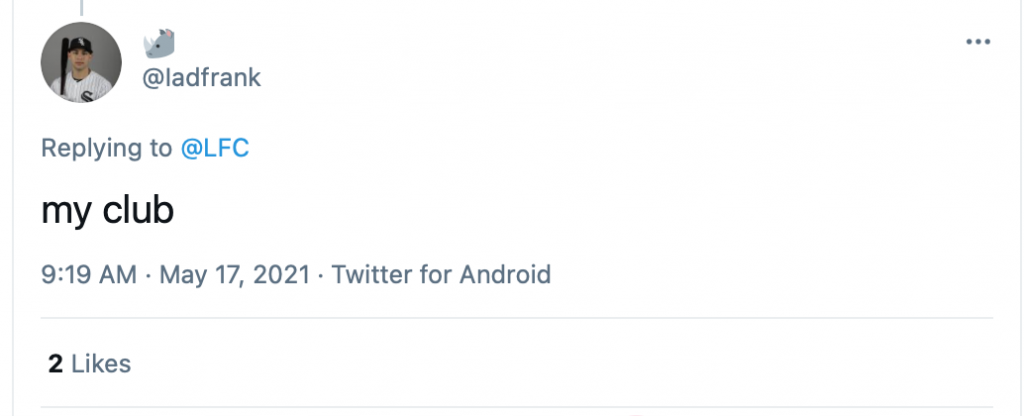
Despite the controversy that surrounds these groups online, the real impact they have on the typical LGBTQ+ fan is huge and is one of the main reasons why football is starting to move towards a point where being LGBTQ is normalised within the ‘beautiful game’.
The idea of having an LGBTQ+ football group has grown rapidly and we are now starting to see more and more Premier League and EFL teams having their own unique fan group.
The importance of having that community as a sounding board has even resonated with a couple of diversity and inclusion officers at clubs who engage well enough with these groups.
Some clubs, such as Charlton Athletic who are currently in League One, have an official affiliation to their LGBTQ+ fan community – in Charlton’s case, Proud Valiants.
According to Pride in Football who are the official network of LGBT+ fan groups, there are approximately 50 LGBTQ+ football fan communities in the UK.
There is no exact number as we are constantly seeing new groups and communities form which as Timms says, is a ‘promising’ sign that football is starting to become more LGBTQ+ inclusive.
In the last year, we have welcomed the newly-formed Rainbow Blades (Sheffield United) and Chairboys LGBT (Wycombe Wanderers) to the family of LGBTQ+ football fan groups.
So why do football clubs need LGBTQ+ supporters groups and how did it all start?
Unsurprisingly, this was another question asked at the Football Supporters’ Association webinar on LGBTQ+ fan groups that I had the privilege to be asked to participate in.
Statistics from Stonewall in the last five years have shown that seven in 10 football fans who have attended a match have heard or witnessed homophobia on the terraces.
Additionally, one in 10 LGBT+ people who attended a live sporting event pre-Covid experienced discrimination because of their sexual orientation and/or gender identity.
Ten percent, despite not sounding a significant amount, is a telling figure as to why LGBTQ+ fan groups and communities exist to help those affected by witnessing or experiencing homophobia in the terraces at a live match.
Gay Gooners (Arsenal) and Villa and Proud (Aston Villa) are two of the biggest LGBTQ+ fan communities out there in the UK.
Both are two large groups among others out there to set up in the early days and give a blueprint to other fans on how running a big network can benefit LGBTQ+ footballing communities around the UK.
Timms, the founder of Villa and Proud and a big advocate for LGBT inclusion in football, describes his journey into setting up Villa’s fan group.
“It was all the key experiences that I had built up over the years with Charlton Invicta (LGBTQ+ inclusive football team) and setting it up with Gary Ginnaw (Sam’s partner) and speaking to a professional football club.
“Aston Villa is a massive part of me,” Timms reflects. “I’ve said it before in the past, it doesn’t matter what team you support – sometimes you are born that way.”
The head of Villa and Proud smiles while clarifying that “born this way” wasn’t a Lady Gaga reference in this case!
He goes on to add: “It’s part of your DNA. I haven’t known any different.
“Aston Villa is the best club, and they reached out to me about it, and so we had a meeting back in June 2018.
“And fast forward to now, we are currently at a fantastic point with our second anniversary which has just passed.
“We have made some amazing strides with the club themselves, and the Villa fans and even football fans in general.”
Villa and Proud has not just provided a safe space for all LGBTQ+ Aston Villa fans to hang out in.
As a result of the Birmingham-based group being set up, opportunities have opened up for Villa fans to help out with the day-to-day running of the group.
Tom Cowley is an LGBTQ+ Aston Villa fan and has been involved in Villa and Proud since its early days.
He has been one of the key figures in the organisation’s growth, and as a result earned the reward of being the social media officer for the network.
Cowley reveals how being part of a fan network like Villa and Proud has changed his experience as a football fan. Not only this, but also perceptions of the LGBTQ+ community have changed as a result of being an active member of the group.
He says: “I think the Villa community in general are an accepting and tolerant fan base.
“At the same time, I think having an LGBTQ specific community suits us well.
“But we prefer to call ourselves a network rather than a supporters group, because that’s really what it is. It’s more of a network for connecting.
“And it does exactly that, it connects you with other LGBTQ fans.
“It’s nice to know that you are not alone in the universe. All the stereotypes you hear in school about gay people only liking dance and drama are not true.
“There are a minority who do like sport, like myself and many other LGBTQ+ people out there.”
The pure existence of these groups mean a lot to their members.
They are so vital that without their existence, many LGBTQ+ fans would decide not to pay interest to what’s going on in the footballing world.
This is the case for Addicks fan and Proud Valiants member Sam Clarke who is proud of Charlton’s inclusivity work, even during the dark times of bad ownership at the club.
“I’ve said it multiple times, I don’t think I would have fallen back in love with football if Charlton weren’t so inclusive,” Clarke surprisingly reveals. “Look at the work they are doing with Proud Valiants.
“We are one of the best-treated supporters groups in terms of their connections to the club.
“This has been consistent even during the darker times for the club when the ownership wasn’t the best.”
Clarke’s views and experiences highlight that without these groups, many LGBTQ+ fans would actively decide not to pursue their interests in the sport. It’s a sad reality.
Thankfully, that’s why we are seeing more and more fan groups set up, with the aim of trying to make football as inclusive as it can be for the LGBTQ+ population.
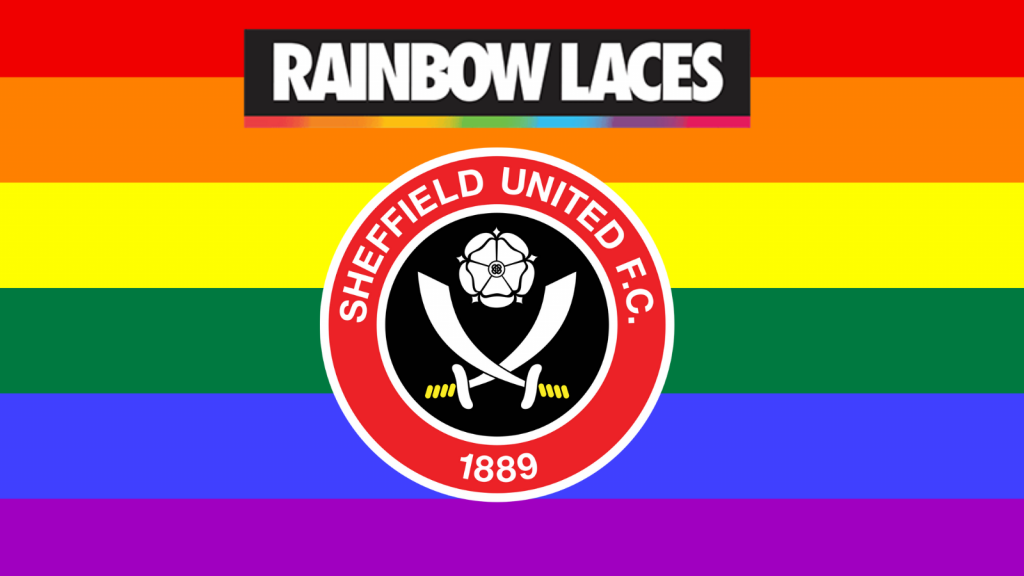
As previously mentioned, Rainbow Blades (Sheffield United) is a newly formed group looking to improve the inclusivity of the ‘beautiful game’ for LGBTQ+ Sheffield United fans.
The Sheffield set-up was created the season after the club got promoted to the Premier League in the 2018/19 campaign, and events officer Callum Mackay offers insight into how the community was built.
Mackay says: “Our founder James Laley assigned different roles as part of the setup of the group.
“It all took place over lockdown, so May 2020, and he (Laley) opened up to the club on their social media.
“I joined up then had an initial Zoom call. And then from that, James asked about who wanted to join the committee, so then I put my name forward and I’m here today.
“We haven’t always had a proper club affiliated LGBTQ fan group. Before Rainbow Blades, there was an LGBTQ+ group in the name of the club. The guy moved away but kept the Twitter page.
“So when James formed the Rainbow Blades page, the guy said you can take over and from there, we then had the task of building our own affiliation to the club.”
Similar to Villa and Proud but in a shorter space of time, Rainbow Blades – despite being newly formed – already have a good working relationship and affiliation to Sheffield United.
“It’s absolutely brilliant. We’ve got really good support already,” Mackay relays to me, when speaking about the relationship with the club. “During one week, we had a committee meeting where we had good fan engagement with the club and also having the diversity and inclusion officer at the club who joined the call was nice to see.
“They are right behind us and get involved with us with the Rainbow Laces campaign.
“They have been collaborating with players trying to get them wearing supportive shirts for upcoming games in the warm-ups during Rainbow Laces month.
“We are having ongoing discussions with players to get them involved in some way and they are really friendly during our discussions which is great to see.”
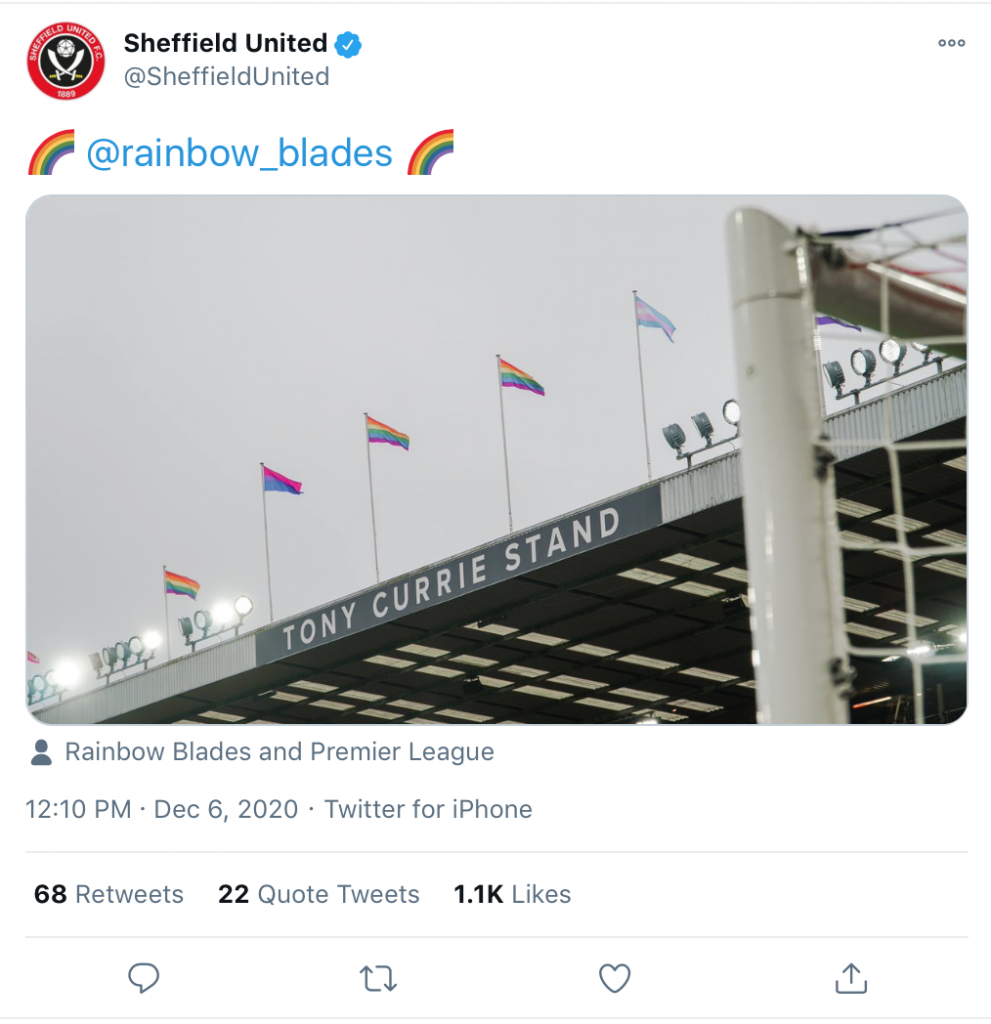
For all the progress at the top levels, evidence suggests that the EFL lag behind when it comes to setting up these LGBTQ+ fan communities.
Charlton are one of a minority of clubs in the EFL League One and Two remit to have an LGBTQ+ fan group. However, the likes of Dons for Diversity (AFC Wimbledon) and Proud Shrimpers (Southend United) are relatively new.
The fact that these groups are being set up for fans of lower league clubs show that the need is there for the majority of clubs in the third and fourth tiers of English football to have an affiliated LGBTQ+ supporters’ network.
Wonderful people at the Football Supporters’ Association (FSA) like ex-player Anwar Uddin are providing the support and funding to help these new fan groups set off in their mission to make football more inclusive.
Looking in from the outside at clubs that don’t have LGBTQ+ fan networks, Mackay believes that LGBTQ+ fans at other clubs would be “envious” of what goes on at these fan groups weekly.
He says: “I think if you are part of a smaller club, you question what you are missing out on.
“You’d be envious looking across the road at what bigger clubs are doing.
“For our part, we are very sociable.
“And if you aren’t part of one, you will be missing out on a number of events which can help build a support network for vulnerable fans who may need a bit of confidence.
“I think many League One and Two clubs and even clubs in the Championship who don’t have an LGBTQ+ fan group should invest in one as there is always a need for it, no matter the size of population.”
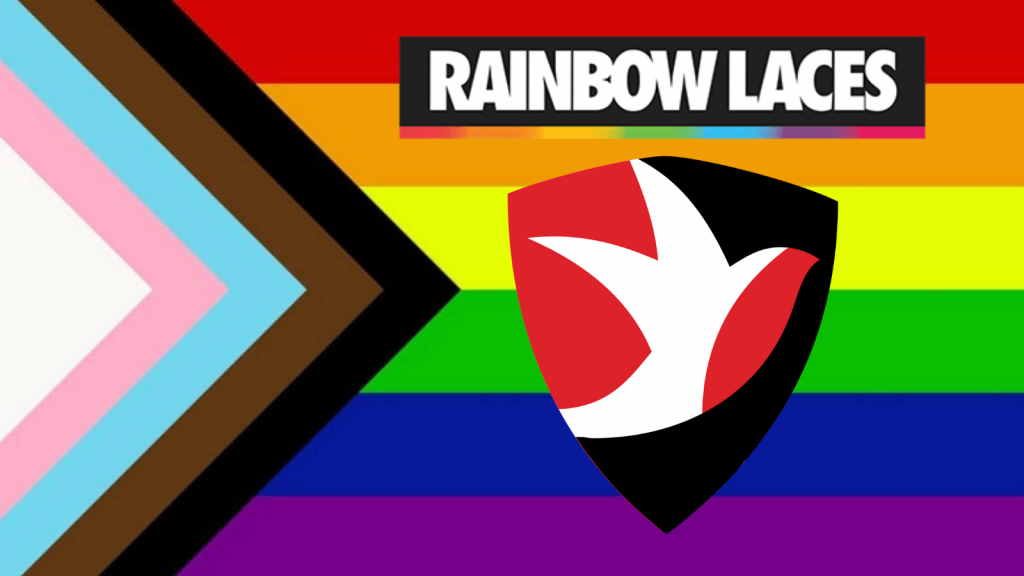
Cheltenham Town fan Jamie Howells explains how his personal experience of football would change if a network was formed for the Robins.
Howells says: “It would massively change my experience, because you’ve got people there who share the same experiences and you can go to them with any problems you have.
“And then someone can go to the club hierarchy to raise that concern.”
When asked why Cheltenham don’t have one, Howells says: “I think it’s the fear of the unknown.
“And we have a relatively older fanbase, so the club may not think it’s necessary to have a fan network for the LGBTQ+ fans who support the club.”
“What has your sexuality got to do with being a football supporter?” Timms believes that your identity can affect the way that you are able to enjoy your experience of watching football live at a stadium.
That’s why these fan groups are essential for the football world and more specifically the LGBTQ+ population – to provide them with a safe space where they know they can be themselves and enjoy the game without any fear of judgement.
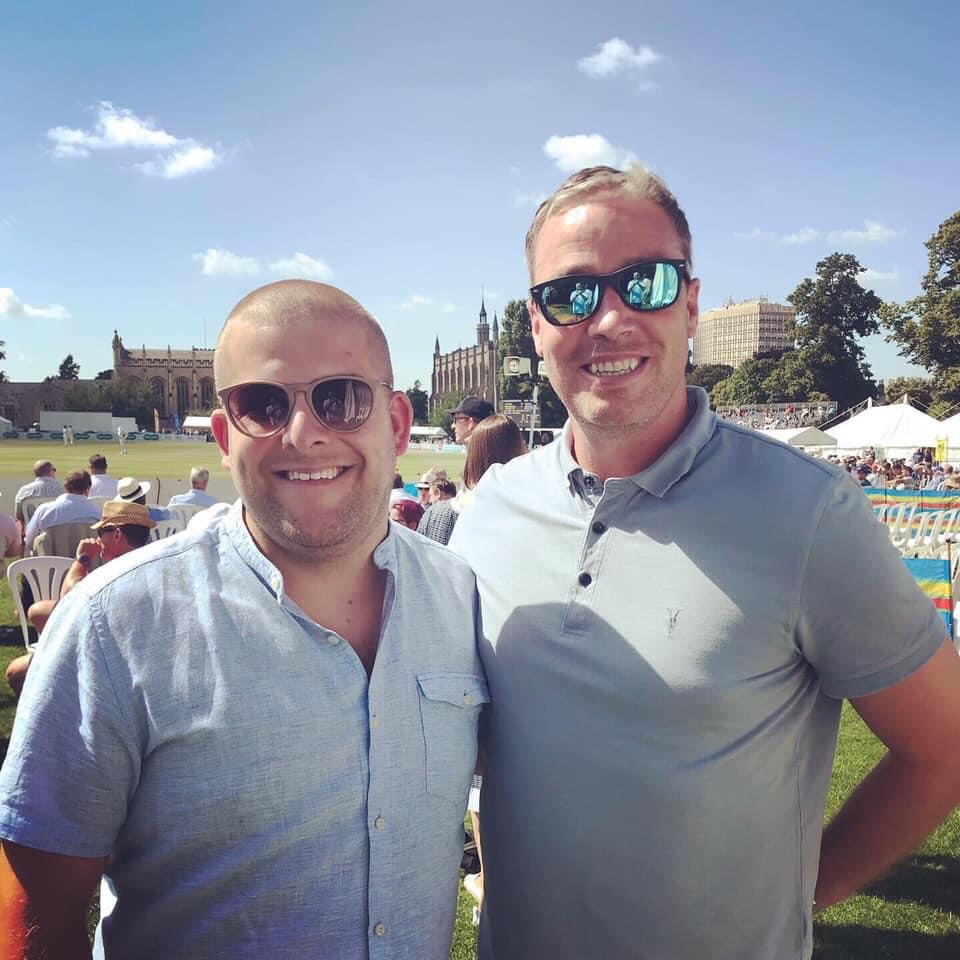
The question remains – can we move forward and strive to a place where the vast majority of clubs in the top four flights of English football have an affiliated LGBTQ+ fan community?
“Meeting people like myself at games would change my life for the better,” Howells believes.
My second feature all about the importance of LGBTQ+-inclusive football clubs will be released later on during Pride Month, so keep your eyes peeled for feature two.
Sports Media LGBT+ is a network, advocacy, and consultancy group that is helping to build a community of LGBT+ people and allies in sport. We’re also a digital publisher. Learn more about us here.
LGBT+ in sports? Your visibility will inspire other people – sharing your story can be hugely rewarding and you don’t have to be famous to make a positive and lasting impact. We encourage you to start a conversation with us, in confidence, and we’ll provide the best advice on navigating the media as part of your journey so that you retain control of your own narrative.
Email jon@sportsmedialgbt.com or send a message anonymously on our Curious Cat.
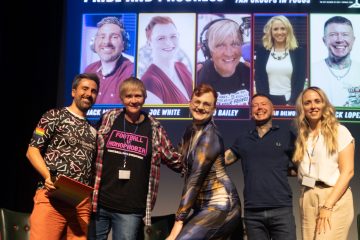
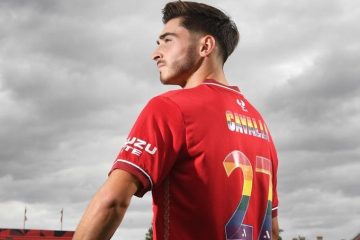

1 Comment
Kevin Miller · 07/06/2021 at 11:19 am
Whitehawk Football Club play in the Isthmian League South East, the 4th tier of the non-league pyramid. We’re based in East Brighton, and are the City’s second biggest football club, next to the Albion. Our fan base is 100%inclusive, we have a LGBTQ+ team, Rainbow Rovers managed by Sophie Cook, and recently both club’s released new kits for the 21/22 and 22/23 season’s, made from recycled plastic bottles from a company called Hope & Glory Sportswear. For every shirt sold we’ll also plant one tree…
In February 2020, just befog the pandemic struck, we were invited by International Sports Broadcasters Optus Sports, to take part in a mini-documentary about the club.
Called, ‘Football For All’, the film captures perfectly who we are, and what we are looking to achieve.
Some clubs are actively fighting discrimination in all it’s forms…
Have a look at the video (6mins), and please keep in touch…
Twitter: @hawksfcofficial @RainbowRoversFC
Insta: @WhitehawkFC @rainbowroversfootball
web: Whitehawkfc.com Rainbowrovers.org
Thank you
Whitehawk FC: Football For All: https://www.youtube.com/watch?v=CEVIwiz6kUc&t=59s
Kevin
Comments are closed.